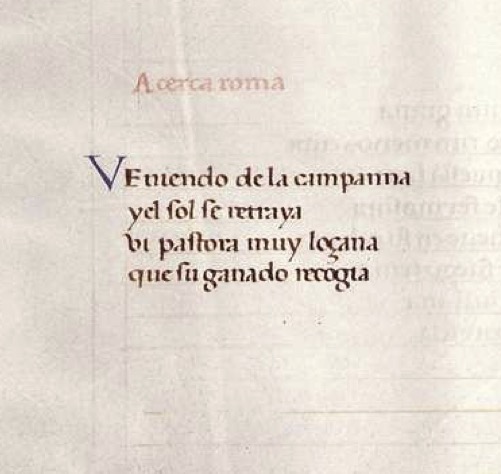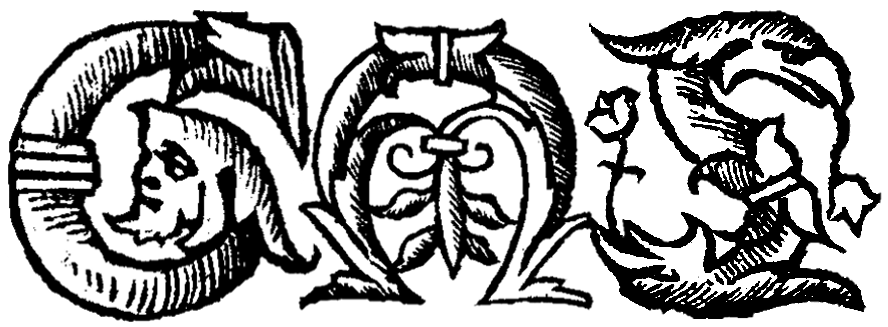As I came from Campagna | Veniendo de la Campanna

Madrid, Biblioteca Nacional de España, VITR/17/7, fol. 154r [Public Domain]
Read the text (PDF)
Introduction to the Text
This poem is a serranilla, an evolution of the Provençal pastorela. Written in short verse ( arte menor), serranillas narrate a courtly poet’s encounter with a mountain woman. This is one of six compositions in the genre by fifteenth-century author Carvajal (or Carvajales). Very little is known about Carvajal’s life. His poetry is linked to the Neapolitan court of Alfonso the Magnanimous in Naples (r. 1442-1458) and to that of Alfonso’s son Ferrante (r. 1459-1494). In addition to his famous serranillas, Carvajal is also known for his literary epistles and ballads.
In this poem, the poet meets a peasant whose gentle appearance, modesty, and simple life are described in detail and praised.
Introduction to the Source
The poem is copied in Madrid, Biblioteca Nacional de España, VITR/17/7, fol. 136v-137r. This manuscript is a copy of the poetry collection known as the Cancionero de Estúñiga , ca. 1465. It has been digitized: http://bdh-rd.bne.es/viewer.vm?id=0000051837. It contains a compilation of mostly Castilian poems, including ballads, as well as a few Italian compositions. Their authors accompanied the King of Aragon, Alfonso the Magnanimous, in Naples in the mid-fifteenth century.
About this Edition
The text has been punctuated. Word separation and capitalization follow modern usage. Elisions have been marked with an apostrophe.
Further Reading
Carvajal. Poesie. Edited by Emma Scoles. Edizioni dell’Ateneo, 1967.
- Critical edition of Carvajal’s poetry.
Gerli, E. Michael. “Chapter 6. The Libro in the Cancioneros.” Reading, Performing, and Imagining the ‘Libro del Arcipreste’.
University of North Carolina Press, 2016, esp. pp. 194-203.
- Reassessment of Caravajal’s serranillas in view of their intertextual relationship with the Libro de buen amor.
Marino, Nancy F. La serranilla española: notas para su historia e interpretación. Scripta Humanistica, 1987.
- Study of the serranilla genre, with attention to Carvajal’s poems in chapter 5.
As I came from Campagna | Veniendo de la Campanna
Veniendo de la Campanna,
y’el sol se retraya,
vi pastora muy loçana
que su ganado recogia.
5 Cabellos ruuios pintados,
los beços gordos bermeios,
oios uerdes et resgados,
dientes blancos et pareios;
guirlanda traya de rama,
10 cantando alegre uenia
e sy bien era uillana
fija de algo parescia.
El arreo de su persona:
saya negra de sayal,
15 de yed[r]a1 traya una sona,
syn pintura artificial,
libre, suelta, suffragana,
padre et madre obedescia
e si bien era uillana
20 fija d’algo parescia.
“De seda rica nin grana
non e deseo nin menos cura”.
Vestida de gruessa lana,
hornada de fermosura,
25 quando llueue en su cabana
çamarra et fuego tenia
e sy bien era uillana
fija d’algo parescia.
“Entre io et mi carillo
30 ganamos buena soldada;
sonando mi caramillo,
biuo io mucho pagada;
iamas non me fallescia”.
E sy bien era uillana
35 fija d’algo parescia.
“De triumphos et grandes honores
yo non curo en negund tiempo;
fortuna nin sus errores
non dauan pensamiento;
40 de toda pompa mundana
muy poca estima fasia”.
E sy bien era uillana
fija d’algo parescia.
As I came from Campagna,
The sun was already setting,
I saw a shepherdess of great beauty
Collecting her flock.
5 Blond-colored hair,
Plump red lips,
Green almond-shaped eyes,
White teeth, all alike,
A wreath of twigs she carried,
10 She walked singing merrily,
And although she was a peasant
She looked like a noblewoman.
As to her garments,
A black skirt made of rough cloth,
15 She wore a belt made of ivy,
No artificial colors,
Free, agile, obedient,
She obeyed her mother and father.
And although she was a peasant
20 She looked like a noblewoman.
“Of fine silk or riches
I have no desire, nor do I care.”
Dressed in coarse wool, Adorned with beauty,
25 When it rained in her hut
She had sheepskin and a fire,
And although she was a peasant
She looked like a noblewoman.
“My lover and I
30 Earn a good living;
Playing my flute
I live much content my life.
I never lacked.”
And although she was a peasant
35 She looked like a noblewoman.
“About triumphs and great honors
I will not ever care;
Fortune and its changes
Do not worry me.
40 Of all earthly pomp
I had little consideration.”
And although she was a peasant
She looked like a noblewoman.
Critical Notes
1 This is a correction of yeda.
